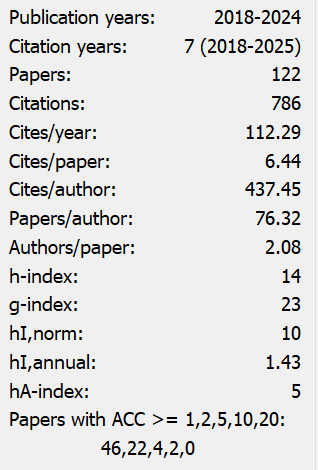The Current Situation, Problems and Countermeasures of the Development of Rural Social Organizations in Poverty-Stricken Mountainous Areas
Abstract
With the continuous deepening and development of the market economy and social structure, a large number of social organizations have emerged in rural my country to represent, serve and safeguard the interests of farmers. Rural social organizations play an important role in participating in social governance, assisting rural construction, and promoting economic development due to their public welfare and social nature. However, due to problems such as lack of endogenous motivation, loose organizational management, and structural imbalances in rural social organizations in poverty-stricken mountainous areas, there are certain constraints in rural integration and self-development. Combined with the current situation, problems and role of rural social organizations in poverty-stricken mountainous areas, we will explore effective countermeasures to strengthen rural social organizations in the process of rural construction and development, and promote the role of rural social organizations through measures such as strengthening party and government empowerment, innovating organizational systems, and strengthening organizational connections. It can be used effectively to improve its promotion and connection functions in stabilizing poverty alleviation results, promoting rural revitalization and achieving common prosperity.
References
[2] National Rural Revitalization Administration. "Special Action Plan for Social Organizations to Assist Rural Revitalization" [EB/OL]. [2022-05-23]. Retrieved from https://www.mca.gov.cn/n152/n165/c39491/ content.html
[3] Huang Huixiang & Liu Ning. (2016). Rural social organizations: growth logic, governance functions and development paths [J]. Jianghan Forum, (11), 61-66.
[4] Zhang Feng (2020). Interest mechanism and system construction of rural social organizations participating in rural community governance [J]. Learning and Practice, (08), 96-104.
[5] Zuo Ding & Su Qingsong (2020). Rural Organization Innovation: Experience in Poverty Alleviation and Enlightenment for Rural Revitalization [J]. Qiusu, (04), 99-105.
[6] Xu Jianqiang, Yu Zhouxu, & Xu Xinsheng (2019). Social organizations’ participation in rural cultural revitalization: value, dilemma and countermeasures [J]. Administrative Management Reform, (01), 51-57.
[7] Zhang Xiaole & Ren Jiawei (2021). Dilemmas and solutions for social organizations’ participation in rural social governance from the perspective of governance community [J]. Nanjing Social Sciences, 2021(10), 62-67.
[8] Li Zhiqiang & Wang Qinghua (2014). Structure-Function" Mutability Theory: A New Interpretative Framework for Research on Transformational Rural Innovation Social Management - Based on the Dimension of Rural Social Organization [J]. Journal of Nanjing Agricultural University (Social Science Edition), 14(05), 8-17.
[9] Lu Suwen & Ai Bin. (2021). Resource dependence and elite authority: two-way dependence and supervision between rural social organizations and grassroots governments [J]. China Rural Observation, 2021(04), 50-66.
[10] Ma Liangcan (2012). Research on the endogenous organization of rural communities and its "involution" [J]. China Rural Observation, 2012(06), 12-21+92.
[11] Du Peng (2022). Organizational logic and governance effectiveness of rural social mobilization [J]. Tianjin Social Sciences, 2022(04), 59-67.
[12] Feng Chao (2022). Autonomy and regulation: The validity logic of rural social organizations constructing publicity—taking Shanxi A Village Intangible Cultural Heritage Protection Association as an example [J]. Rural Economy, 2022(04), 82-89.
[13] Wu Yuefei. (2022). The inherent tension and resolution of rural community organization in the context of rural revitalization [J]. Journal of Northwest A&F University (Social Science Edition), 22(05), 52-61.
[14] Yao Jinzhong & Lin Yueying (2023). Service-oriented governance: Practical logic and path construction of township social work stations [J]. Journal of China Agricultural University (Social Science Edition), 40(04), 128-146.
[15] Wu Sibin. (2018). Rural revitalization requires the participation of multiple forces [J]. People’s Forum, 2018(32), 72-73.
[16] Zhang Minghao & Ye Jingzhong (2022). The inherent mechanism and realization path of urban-rural integrated development promoting common prosperity [J]. Rural Economy, 2022(11), 1-10.
[17] Zhang Jianwei. (2022). Revitalizing rural areas in the integrated development of urban and rural areas [N]. Farmers Daily, 2022(002).
[18] Zhang Zhaoxin & Wu Tianlong (2019). Cultivate social organizations to promote the “farmer-centered” rural revitalization strategy [J]. Economic Perspectives, 2019(1), 29-35.
[19] Wang Sangui & Feng Zixi (2020). Logical relationship between the effective connection between poverty alleviation and rural revitalization [J]. Guizhou Social Sciences, 2020(1), 4-6.
[20] Wang Sangui, Huang Yijie & Ma Lan (2022). Changes in the characteristics of the endogenous motivation of the population out of poverty in western China, governance practices and consolidation and expansion paths [J]. Journal of South China Normal University (Social Science Edition), 2022(3), 5-15+205.
[21] Su Fang, Pu Xindong, Xu Zhongmin & Wang Lian. (2009). Research on the relationship between livelihood capital and livelihood strategy - A case study of Ganzhou District, Zhangye City [J]. China Population, Resources and Environment, 2009(6), 119-125.
[22] Shang Haiyang & Fan Jiaojiao (2022). Research on the role of rural social organizations in enhancing social capital and coping with livelihood risks [J]. Resource Development and Market, 2022(10), 1231-1237.
[23] Wen Tiejun & Yang Shuai (2012). Rural governance and rural development under the background of changes in China's rural social structure [J]. Theoretical Discussion, 2012(06), 76-80.

This work is licensed under a Creative Commons Attribution 4.0 International License.
Copyright for this article is retained by the author(s), with first publication rights granted to the journal.
This is an open-access article distributed under the terms and conditions of the Creative Commons Attribution license (http://creativecommons.org/licenses/by/4.0/).


























